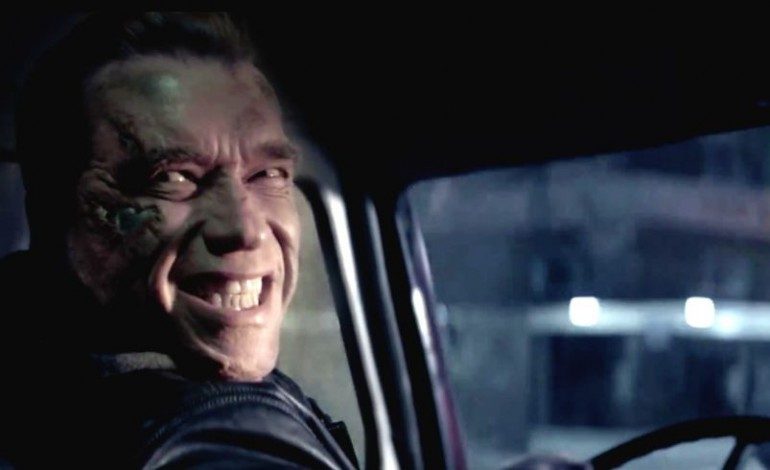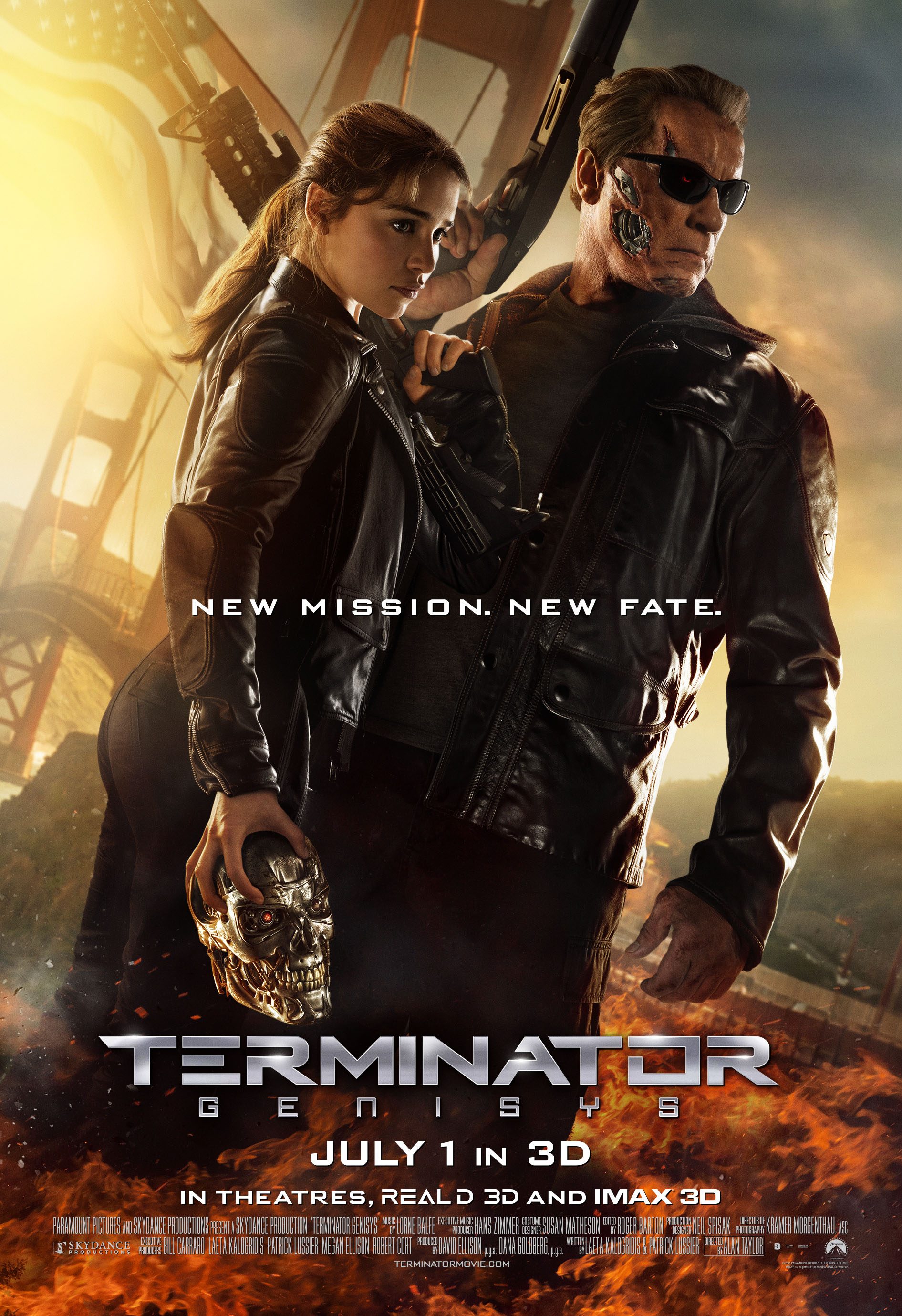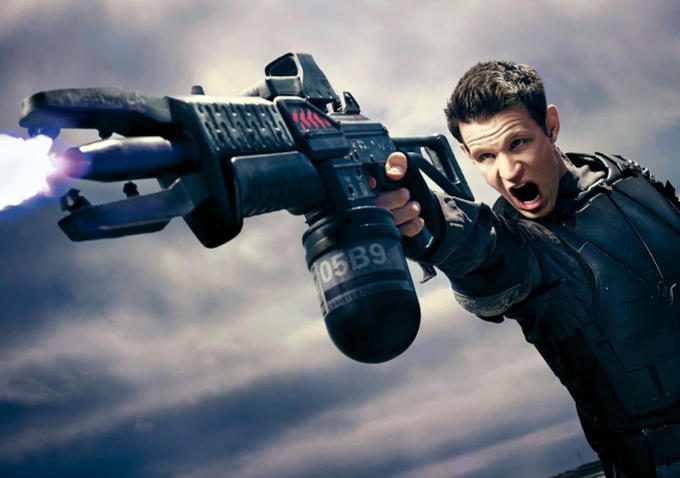

When looking at Terminator: Genisys there are two questions to consider : 1) How well does it contribute to the legacy of James Cameron’s first two Terminator classics? 2) How well does it stand on its own? Disappointingly, the answer to both is “not good, not good at all.”
After two bonafide classic movies and two less than enthusiastically received sequels (plus a pretty fantastic short-lived TV series), Terminator is back to simultaneously right the wrongs and wrong the rights of the past. There’s a completely new cast (except for Arnold Schwarzenegger returning as A Terminator) and a completely new timeline. 1984 is no longer classic 1984, it’s a 1984 where Sarah Connor has been raised by Pops (a reprogrammed T-800 played by regularly aged Schwarzenegger) since the 1970s, and T-1000s are causing havoc for her and Kyle Reese, recently back from the future. And they still have to contend with a Skynet anxiously waiting to bring forth Judgment Day.
Except now Skynet is an about-to-be-launched-in-2017 app named Genisys that will sync up one’s phone to their computer. (I know, how do they come up with these ideas for future tech?) While updating the series’ base technological fear to something more relevant to our modern age makes sense, the movie fails at making it actually pertinent any significant way. Jurassic World had fun likening the Park itself to the “louder, more teeth” requirements of big budget tentpoles. Genisys, which has a far greater opportunity to discuss the world in which we live in, fails in achieving something as significant or satirical. Apps are things that people use… so that’s where Skynet is lying in wait.


Disappointingly, Sarah never carries around a Terminator head in the way she does in all the posters for this movie.
Yet for as much as Genisys tries to differentiate itself from the original films by completely deleting them from history, it is too beholden to the past to fully be its own entity. None of the characters or their emotional journeys work unless you’re imbuing in them your relationship with Linda Hamilton’s Sarah Connor or Michael Biehn’s Kyle Reese. The casting is a major problem with this. Emilia Clarke as Sarah carries with her neither the vulnerability of The Terminator‘s Sarah nor the desperate, strong insanity of Terminator 2 Sarah. Instead, she comes across as more petulant and whiny than either of her two predecessors and lacks the presence Hamilton gave to the role. Although she has already “accepted” what happened in previous movies (presumably because Pops informed her about them), there’s a difference between “accepting” something and “feeling” it. It’s difficult to believe her connection to John when she has never given birth to him. Jason Clarke might be adequate-at-best as John Connor-turned-The Johninator, but this is John Connor, the savior of humanity – you want more, you want mythic. The final battle between him and The Terminator should be something building for 30 years, it shouldn’t be just another generic boss fight … and we probably shouldn’t be rooting for The Terminator.
However, the biggest problem is Jai Courtney as Kyle Reese. The latest hunk Hollywood is attempting to turn into a star, he is so woefully miscast that he almost single handedly brings the movie down. He lacks the frantic ratiness that made Original Kyle so memorable, he simply cannot do the cutesy banter with Sarah that the dialogue sometimes requires of him and he makes snarkiness sound more like irritation than sarcasm. He could have been a fine Terminator. With the possible exception of the severely underused Matt “Eleventh Doctor” Smith as [REDACTED], the only actor who is really worth watching is JK Simmons, which shouldn’t be surprising to anyone who has seen anything Simmons has done in the past. An utterly pointless character as a conspiracy theory-obsessed detective who bore witness to the events of 1984, he elevates every single scene he’s in. Every time he’s on screen, he brings an energy, excitement, and humor noticeably missing from every other character in the film.
Which brings us to the big selling point: Arnold Schwarzenegger. Yes, the big man is back as the T-800…and he represents “fan service” at its absolute worst. Fan service can be used to great effect, as Marvel does it by throwing in Easter Eggs and references that would only make sense to long-term fans of the comics without taking those unfamiliar with the language out of the movie. Genisys represents the most negative aspect of the concept — that being throw it in because it’s something everyone knows. (Similar to the use of Khan in Star Trek Into Darkness.) His inclusion is not for people who actually care about the franchise; it’s a cynical attempt to appeal to audiences who just know that Arnold is The Terminator. He makes jokes about being “old but not obsolete,” and that’s pretty much it. I guess one could argue some logic in that they know how to program that model according to T2, but there’s no actual connection between Sarah and Arnold Terminator in this timeline so it’s just there because.
And that’s what a lot of this movie feels like– “it’s just there because.” The needlessly overlong 1984 sequence consists of pointless action sequences and exposition while practically ignoring character development. Even the 20-minute sequence actually set in the Future War at the beginning is less impressive and effective than just simply hearing about it from Kyle and seeing brief glances of his nightmares in the first Terminator. By the time we get to 2017, we’re already about an hour into the movie so it never takes the time to slow down and establish the relationship/trust between the Johninator and his parents. For as stupid as revealing that twist in the trailer was, the movie still fails to make it so that reveal actually means something. We have to get to the gunplay and explosions. Similarly, it never gives us an idea why the Genisys App is so important and groundbreaking. (Without getting too heavily into spoilers, the motive of Skynet changes drastically, to something far, far less poignant and far, far stupider.)
Most of everything else that happens seems similarly irrelevant– the battle of the Golden Gate Bridge, the destruction of Cyberdyne, even the battle of Young Arnold vs. Old Arnold is functionally pointless though looks quite good. Director Alan Taylor certainly knows how to film an action scene, but they are to no actual effect. It’s the type of movie that doesn’t have enough of a sense of humor to go all in on completely blowing up wibbly-wobbly timey-wimey paradoxes (like Futurama‘s “Roswell That Ends Well”) nor the intelligence to seriously response to logic holes. But at least we get the sequel-promising mid-credits sequence, because why bother to get it right the first time?
Verdict: 1 out of 5
Although not the narrative mess of Terminator: Salvation, Terminator: Genisys is still a low point in the franchise. Although the best looking of the non-Cameron movies, Genisys is the type of mindless action shlock that Terminator 2 would be if the studio took control away from Cameron and gave the reins to a director-for-hire who only believed that audiences wanted to hear “I’ll Be Back.”

